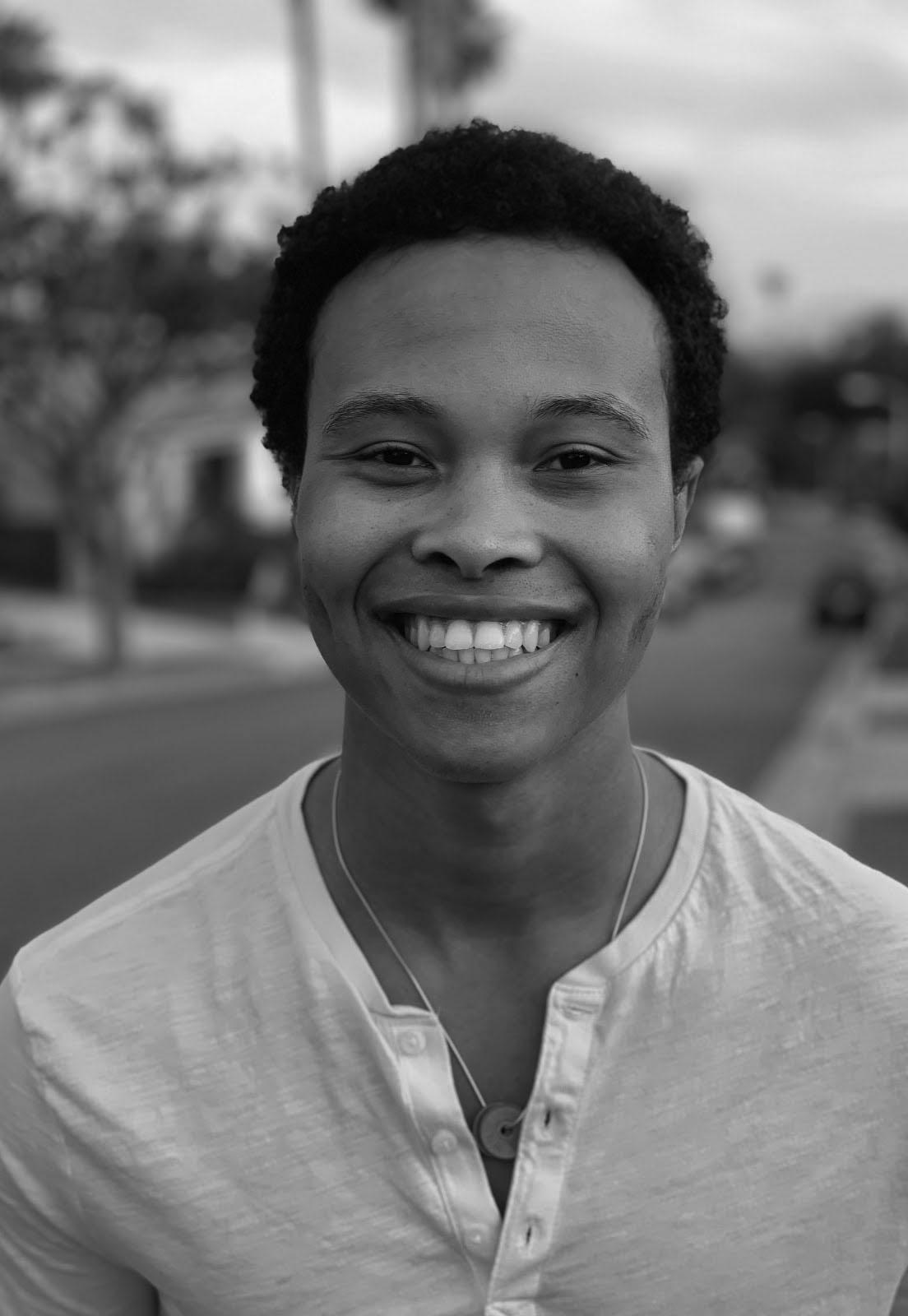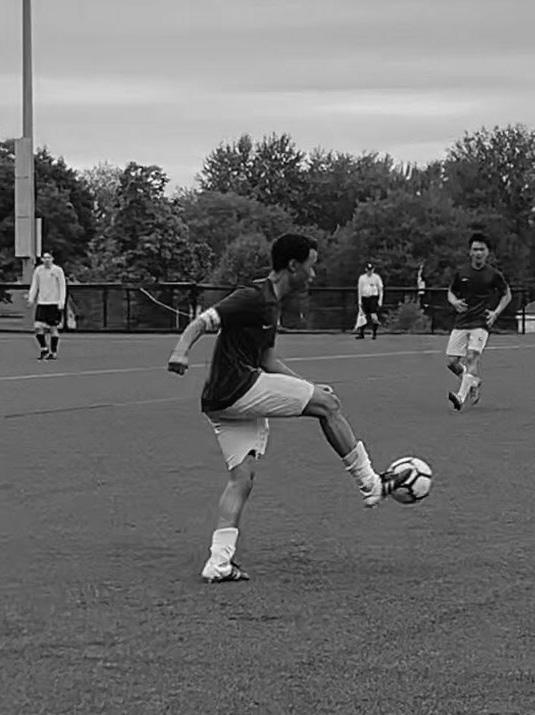
7 minute read
Noah Wheaton
Senior Profile | Noah Wheaton Defending Equality, Across His Fields
As a pre-med student, Noah Wheaton exemplifies active service for kind causes; his work with the Black Student Union and other groups has transformed Amherst, leaving a lasting impact on the frontier of equality. —Jack Dove ’23
Advertisement
When I sat down to talk with Noah Wheaton ’20, he recounted a story from when he was ten years old, trading Pokemon cards with his brother Sirus Wheaton ’23 at a Los Angeles summer camp; he heard a loud “pop,” and Sirus abruptly stood up, walking away with his hands on his head. Noah realized something was wrong when he saw blood staining Sirus’s head and hands — someone had thrown a rock and hit his brother square in the head.
As a child who hadn’t even lost all of his baby teeth, Noah reacted with decisive, selfless passion and dashed to nearby counselors, instructing them to get medical help for his ailing brother immediately.
“Even if I can’t do that much,” added Noah, “I was just trying to do anything possible to help.”
Even now, it’s clear how Noah remains just as compassionate as he was back then, dedicating his past four years at Amherst to bettering the college community and pursuing an academic track that will prepare him to better the world, too.
L.A. Soccer Star
A Los Angeles resident from birth, Wheaton credits his athletic experiences for much of his character development from a young age. “Soccer has been the biggest way for me to figure out who I am; I figured out how to communicate with people and become a sociable person,” he said.
Besides representing a platform for making friends, Wheaton thinks of the sport as an emotional escape: “I feel like the place where I have the right to feel comfortable in my own skin is through just playing soccer.”
Perhaps his biggest fan is his teammate and brother Sirus, who considers Noah to be possibly the greatest player to have ever played for the Amherst Football Club (AFC). “He is better than a lot of the varsity players,” bragged Sirus. “He wins every ball and then goes in twice as hard for the next tackle or run. He’s a true offensive threat and someone you could always rely on defensively; he was the lifeline of the team.”
Noah is a center midfielder, which is considered the most taxing and most involved role on the soccer field.
He credits his leadership role on the field with building his confidence and helping him find a home at school. “It now very much feels like family,” reflected Noah.
Integrating Amherst
Soccer was also a motivating factor for Noah to begin exploring the topic of racial equality. “Sometimes walking to a soccer practice with my club team, cops would pull me over,” said Noah.
Noah has multiple memories of police officers stopping him on his walks to his private high school science lab “because I was a Black man on his phone that shouldn’t have been at a private school,” he said.
Growing up, Noah found that, while he wasn’t necessarily too cognizant of being Black, other people were instead emphasizing his skin color to him. Wheaton recalls a fifth-grade classmate demanding him to “say the N-word,” simply because he was Black.
Just as he felt a racial divide in his hometown, Wheaton also noticed separation within the Amherst student body.
Photo courtesy of Noah Wheaton ’20
Noah is well known for his smile and can-do initiative in matters concerning equality across and beyond the Amherst campus.
“You can really see it where the parties are, as well as with the whole mixer dynamic,” he said, referring to mixers between athletic teams and other groups.
The college is known for being extremely diverse relative to its peers, with a 56.2 percent non-white student body. However, Noah believes diversity doesn’t tell the whole story: “As much as Amherst says that we are diverse, the truth is we are not very inclusive.”
It was this dichotomy between diversity and inclusivity that drew Noah towards the Black Student Union (BSU). With no similar group at his high school, Noah quickly joined the Amherst affinity group after his first meeting when he was a first-year.
Ascending to the executive board (E-board) his sophomore year as the club’s treasurer, Wheaton took on multiple roles with the BSU before becoming co-president during his senior year. As president, Wheaton facilitated group meetings and provided inspirational leadership and direction to all members of the club.
Many Amherst community members took notice of Noah’s efforts, including Professor of Psychology and
Faculty Diversity and Inclusion Officer Allen Hart.
“The work of holding the college accountable for creating a more inclusive campus is layered and multi-faceted,” said Hart, “and under Noah’s leadership, the BSU has again become a booming voice in shaping Amherst’s future.”
Lauding Noah’s contributions to his course “Intergroup Dialogue,” Hart added that Noah’s “impact and legacy at Amherst will continue long after graduation.”
Noah’s most recent task with the BSU was the response to a recent incident of racism on campus, where three students on the men’s lacrosse team chanted the N-word outside a teammate’s room.
To Wheaton, this issue was not an individual incident, but a problem related to the men’s lacrosse team.
“I remember hearing hate speech being shouted on the third floor of Jenkins during my freshman year, and from my junior year [the incident of] the swastika drawn on someone’s face,” said Noah.
In the BSU’s letter calling to “Integrate Amherst,” which responded to the school’s action regarding the racist incident, the authors argued that the issue at hand brought to light a lack of institutional protocol for disciplining hate-speech and racism.
“One of the big issues is that we don’t have a guideline for this,” commented Wheaton. “Hate speech should be [weighed] as much as throwing a punch.”
To Wheaton, the recent altercation represents the peak event from his time with the BSU.
“Being the face of the BSU, this feels like the biggest moment that’s come up,” said Wheaton. The administration responded positively to the changes the BSU outlined, with the final piece in the series reporting a new Amherst College institutional bias reporting and response protocol. It’s quite a legacy to leave behind, and Wheaton feels extremely proud of his time with the BSU: “I love to help my community out as much as they help me.”
The Medical Frontier
Just as he condemned racial inequities as co-president of the BSU, Wheaton fights for comparable medical treatment for all.
From a young age, he had an interest in the inequalities of medicine: “I’m really interested in health care and its equity disparities, which started when I was in high school,” said Noah.
Even as a third grader, Noah spent time volunteering at the Dream Center in Los Angeles, which provided supplies and care for Hurricane Katrina evacuees.
As a psychology major, Noah followed a pre-med track through his time at Amherst. Noah’s passion for medicine and psychology was clear to Catherine Sanderson, the Manwell Family Professor in Life Sciences (Psychology).
“I’ve really seen him come full circle,” said Sanderson, “from conducting his very first lab report in Intro Psych to delving much more substantively into theory and research into an upper-level course [Close Relationships].”
Besides his work as a student EMT with the Amherst College Emergency Medical Services (ACEMS), Wheaton has engaged in the healthcare industry through summer jobs. After his first year, Wheaton shadowed orthopedic surgeons in Cleveland,
Photo courtesy of Amherst Football Club

While Wheaton grew up a defender, his transition to center midfielder better fit his leadership instinct. As captain of the Amherst Football Club (AFC), Wheaton’s efforts on and off the field have propeled the club soccer team from a winless group to a talented, passionate campus icon.
Ohio; this past summer, Wheaton worked as a volunteer and research assistant at the New York Presbyterian Brooklyn Methodist Hospital.
“I shadowed doctors, volunteered on certain hospital floors and did some research in regards to women’s health, abnormal pap smears and cervical cancer,” he said. Wheaton is looking to complete a post-baccalaureate program to prepare for medical school, where he would train to eventually achieve his dream job as a doctor.
To Wheaton, the ethos of such a respected medical position might carry weight in the battle for healthcare equality.
It seems like the perfect profession for Wheaton, who, simply put in the words of his brother Sirus, “is always thinking about people other than himself.”










